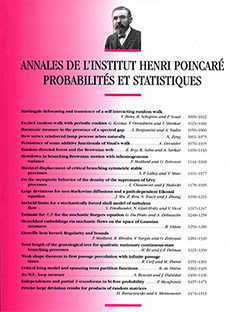Abstract
We introduce a class of random graph processes, which we call flip processes. Each such process is given by a function from all labeled k-vertex graphs into itself (k is fixed). The process starts with a given n-vertex graph . In each step, the graph is obtained by sampling k random vertices of and replacing the induced graph by . Actually, our definition is more general, in that is a probability distribution on , thus allowing randomised replacements.
Given a flip process , we construct time-indexed trajectories in the space of graphons. We prove that for any starting with a large n-vertex graph which is close to a graphon , with high probability the flip process stays in a thin sausage around (after rescaling the time by ).
Among others, we study continuity properties of these trajectories with respect to time and initial graphon, existence and stability of fixed points and speed of convergence. We give an example of a flip process with a periodic trajectory.
Nous introduisons une classe de processus aléatoires sur graphes, que nous appelons processus de retournement (flip processes). Chacun de ces processus est donné par une règle qui est une fonction de tous les graphes à k sommets étiquetés vers lui-même (k est fixe). Le processus commence avec un graphe à n sommets. À chaque étape, le graphe est obtenu en échantillonnant k sommets aléatoires de et en remplaçant le graphe induit par . Cette classe contient plusieurs processus connus comme le graphe aléatoire Erdős–Rényi et le processus de suppression de triangles. En fait, notre définition est plus générale, dans le sens que est une distribution de probabilité sur , permettant ainsi des remplacements aléatoires.
Étant donné un processus de retournement de règle , on construit des trajectoires indexées en temps dans l’espace des graphons. Nous prouvons que pour chaque et chaque (grand) graphe fini qui est proche d’un graphon dans la norme de coupe, avec une forte probabilité le processus de retournement initié à restera dans une fine région autour de la trajectoire (après remise à l’échelle du temps par le carré de l’ordre du graphe).
Ces trajectoires de graphons sont ensuite étudiées du point de vue des systèmes dynamiques. Entre autres sujets, nous étudions (i) les propriétés de continuité de ces trajectoires par rapport au temps et au graphon initial, (ii) l’existence et la stabilité des points fixes et (iii) la vitesse de convergence (lorsque la limite de temps infinie existe). Nous donnons un exemple de processus de retournement avec une trajectoire périodique.
Funding Statement
FG: Parts of the work were done while affiliated with the Institute of Mathematics of the Czech Academy of Sciences. Research supported by GAČR project 18-01472Y and RVO: 67985840. Furthermore, this work has received funding from the European Research Council (ERC) under the European Union’s Horizon 2020 research and innovation programme (grant agreement No 648509). This publication reflects only its authors’ view; the European Research Council Executive Agency is not responsible for any use that may be made of the information it contains. This author was also supported by the MUNI Award in Science and Humanities of the Grant Agency of Masaryk University.
JH: Research supported by Czech Science Foundation Project 21-21762X.
MŠ: Research supported by Czech Science Foundation Project 20-27757Y, with Institutional Support RVO:67985807.
FS: Research supported by the Wallenberg AI, Autonomous Systems and Software Program (WASP), the project AI4Research at Uppsala University, and a Simons-Berkeley Research Fellowship.
Acknowledgments
We thank Hanka Řada, Joel Spencer and Lutz Warnke for their comments. We also thank an anonymous referee for their feedback.
Citation
Frederik Garbe. Jan Hladký. Matas Šileikis. Fiona Skerman. "From flip processes to dynamical systems on graphons." Ann. Inst. H. Poincaré Probab. Statist. 60 (4) 2878 - 2922, November 2024. https://doi.org/10.1214/23-AIHP1405
Information





